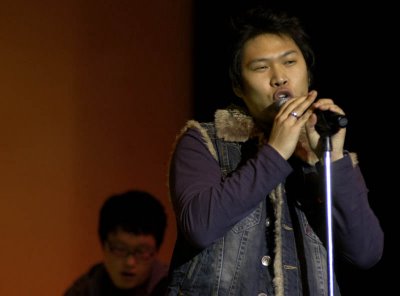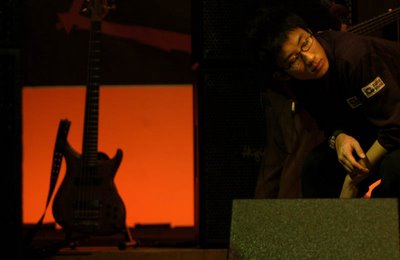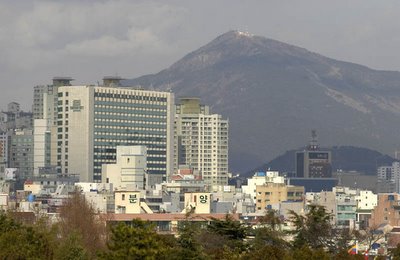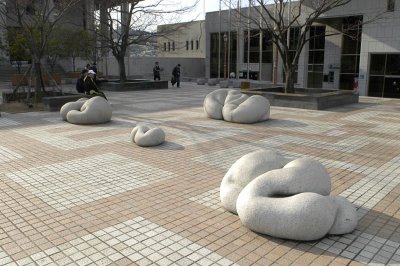I had to smile as I remembered a time long ago when all the joy in the world was to kick a ball up a hill with my friend. The memory is old, and to have it resurface and reconnect with my life now, here, is surreal but hardly unusual. It's been happening to me a lot the last few months.
In some measure, memory is a tool your mind uses to craft your behavior in all of life's social situations. When you go into a new social situation, your mind draws on similar events from your past for guidance. While walking the path of a teacher I have encountered those old memories and reconnected with those old joys in part because they are the only experiences I have to fall back on when I need to understand the children in my classroom. I'm being taught to be a teacher by my inner child.
I'm really enjoying teaching. It's strange, because a year ago children were a complete mystery to me. I would go on assignment for the newspaper to photograph them at a school, and I would look at the teachers and think, "wow, how in the hell to they hang with ten-year-olds all day and maintain their sanity?" But there'd they be in my viewfinder, smiling and laughing with their charges like they were ten years old, too. I understand that now.
Being around children, particularly children as carefree and eager to learn as Korean fourth-graders (my personal favorites), is good for the soul. Advanced One is my favorite class. When I come prepared to teach, they're always ready to learn, and when I want to goof off and be silly, they are equally equipped and happy to oblige.
Every Friday after we've read the hopelessly inadequate reading assignment, I give them a word search puzzle as a treat. Most of them sniff out and circle all the words within minutes. To the winners go the stickers, and even to some of the losers I give stickers (which they redeem for pencils, rulers, and other treats from Mr. Kim). Then we goof off for the last ten minutes of class.
Last Friday we had a wrestler-impersonation contest. The whole class calls me "Mr. Jones Cena," mixing up my name with the W.W.E wrestler, Jon Cena. I took it upon myself to find out who this man was, his moves and his sound bytes, and I started out the contest with my best impression of the actor.
"Hey! You CAN'T see Me!!!" I growled at the class with a steely look fixed in my eyes and flexed my imaginary biceps. The class roared with laughter and Young-jin jumped out of his chair and stood in front of me in a square-step wrestler's stance, his pudgy Korean hands ready to deliver a Bautista Bomb, 6-1-9 or Pile-Driver.
"NO, fool!" He shouted in perfectly enunciated English. "You Can't see ME!" And he ran at me, head lowered. I easily scooped Young-jin up and spun around with him on my shoulders, both of us yelling our heads off and laughing. The class went bonkers, clapping and rooting for Young-jin.
* * *
I strive to rise to the challenge of making learning fun for the kids. I don't always achieve my goals. I'm working against a number of obstacles. First of all, the best I can do with English is speak it. As Gavin pointed out a few nights ago over dinner, we really don't really have a complete academic background in the language we speak fluently. This only becomes a problem when the children start asking 'why.'
Strangely, that doesn't happen much. Since they don't really have to worry about flunking out of ESS, I guess most of the children take what they get and don't worry about what they're missing. Every now and then one of the few students who are truly invested in learning English will ask good, pointed questions.
While teaching 3E1 about the past tense utilizing an impromptu dialogue between me and an imaginary taxi driver, a student named Yeo-jin asked me why the dialogue was in the present tense while the narration was in the past tense. I cocked an eyebrow and stared at the blackboard, wondering if I had made a mistake. The sentence she was talking about was as follows:
--Mr. Jones stepped into the taxi. "Take me to Gimhae airport at once, driver!" he said.--
Yeo-jin pointed at the word 'said,' and then she indicated the jump from 'stepped' to 'take,' which according to the rules laid out in their book is incorrect.
"Teacher, the sentence has a past tense and a present tense verb," she calmly pointed out. The other students, normally only half-interested in my lessons, detected the smell of blood in the air and woke from their lethargy to see which way the wind was blowing. The balance of power was in limbo. I knew the answer was simple. I knew there was a clear, concise reason for the inexplicable shift in verb tense and I knew it had to do with the grammatical structure of dialogue. But the glaring spotlight Yeo-jin turned on me cast my supposedly solid grasp of English into a spurious shadow. I had no answer for her.
"I'm sorry, Yeo-jin," I said calmly. "I don't know why." Yeo-jin nodded thoughtfully and for a minute teacher and student regarded each other in the new light of common understanding. I am not qualified to teach english, and she knows it, but in that prolonged exchange I detected a degree of understanding. Something was confirmed for her at that moment, I could tell. Yeo-jin is one of the brightest students in the school. She's been here for years. I am positive she knows who the pieces in this game are and how they are moved. There was no malice or disrespect in her countenance. She just wanted an answer.
It galls me how much better prepared and trained the Korean teachers are. The two newest teachers at ESS, a perky Korean named Na-ri and a small woman whose name I forget, have spent the entire month of January training under the careful tutelage of Mrs. Nam. The both have degrees in English or English education from Marine University and Na-ri has teaching experience.
As Gavin points out, the Korean teachers normally stay with ESS longer than a year, but the difference in training still stands as a glaring reminder of the native teacher's true purpose in this business: Window-dressing, promotional material, purchased credibility. "Hey, look! We have real, flesh-in-blood native teachers working at OUR school. We're professional." Even the name, "Native Teacher," connotes a certain degree of unsophisticated, colloquial knowledge of our culture and language, like we're some sort of bushman-guide for the refined Korean explorers of the English language.
Don't say I told you so. I was perfectly sober when I signed that contract. Still, the one day of training I received at the hands of Mike, Julie and Dennis was a joke, the punch line being my first day of class the following Monday. After a while I realized how simple this lack of expectation made my job. I got the joke, so to speak, and I had to laugh. However, the laughing stops whenever a student like Yeo-jin asks me a question and I can't give a strait answer.
* * *
The new room given over the teachers is working out well. It's big, warm, and outfitted with snazzy new lockers that help control the clutter of a dozen people working there at once. Mrs. Nam chose Tuesday and Wednesday nights to organize the mountains of books at the foot of her desk. I shoveled down kimbop (Korean ham-and-cheese-and-vegetable sushi) between helping Gavin put the books to be thrown away in a giant box. Gavin set aside the Sesame Street books.
"You don't just throw away Sesame Street," he stated and stacked the precious relics from both our childhoods on his desk.
Over dinner I spoke my first complete sentence in Korean. "I eat dokpokki," I slowly said. The Koreans cheered me on and I felt a little like one of my 1-2P students when they nail a word like "red."
* * *
A child named Rick in Special Class played a practical joke on me. Special Class is a group of children who for whatever reason lived in English speaking countries for an extended period of time and their parents want them to retain the conversational skills they naturally formed while abroad. They aren't in the conventional learning tract that the other children follow over a course of years. First of all, some of them speak better English than a few of the Korean teachers who would instruct them. We focus on conversation and tougher subjects like social studies and science.
So I afford them more perks than the other children. I would never let a child in 4B go piss in the middle of class on the rationale that if they can't even put together the four words " I need to go pee," in the first place, they shouldn't miss a minute of class. However, when Rick (Pil-su) in Special Class calmly and naturally asked me to go piss when I walked into class Monday, I said sure. I had to piss, too, so we all made a small field trip out of the event. Everybody got five minutes to go piss and grab a cup of water.
I sidled up to the urinal and started to piss just as Rick was washing his hands. He walked out the door and left it wide open, leaving me in plain sight of anyone in the lobby.
"Hey, Rick, close the door, please!" I yelled after him. I heard a giggle come from behind the door that I took to be Rick and Gyeong-gu, his partner in crime. "Rick! Close that door!" I yelled again. Still nothing. The door was far out of reach and for a good minute or two my urination was public spectacle for all the world to see. After I washed my hands Rick and I had a little conference on his manners.
* * *
On to the photos! I must admit that I was sort of slack about taking photos this week because I have been smitten with my new video camcorder. I am currently involved in a time-lapse project centered around the subway system in the style of the movie Baraka. It's not an original idea, but it's fun and it gives me experience to employ in future creative explorations of the moving photo. Here's what I got.
There was a cold snap on the way this past Sunday, so I used the last day of unusually warm weather - Saturday - and drove around the city on my bicycle. Korea has taught me to be an incredibly defensive driver. There's nothing quite like watching a ten-ton city bus veer across four lanes of traffic without regard to anyone else on the road to sober a man up. I ended up at the cultural center near the UN cemetery.
In one of the buildings, auditions for some sort of music show were being held. Musicians from across the city sat in the auditorium and strummed their songs on the silent strings of electric guitars while others took the stage and showed off their skills. Their music had a classic rock sound despite the musicians being dressed like indy or punk rockers. "Is that a Boston or a Chicago tune?" I would think to myself as they played. But the music was original. Only the style had been pilfered.

Some of the singers should have studied more.

Their sound technicians were top-notch. The music was live, but it had a highly-finished quality to it.


Practice, practice, practice. Eat kimchi.

The cultural center itself was an architectural dreamland, with many levels covered in manicured gardens framed by benches and lightposts. If it had been warmer, I would have stopped and read my book for a spell.

From it's perch at the top of a hill, the cultural center sported a commanding view of the mountains around Busan, too.

Naturally, the place was overrun with families out for a little quality time and fresh air. This child was climbing around on the structure and got in a little over his head. Luckily, that's why God created parents.

A nice pattern in the courtyard presented an attractive background for a Stephen 'walking guy' photo.

Part of the beautifully-patterned courtyard was adorned with these giant concrete sculptures in the shape of, well, big piles of shit. Strangely, Gavin came across a different concrete statue on the other side of the city that looked like a big naked ass crapping right in front of an office building. Maybe at night...

Don't give me no 'annyong haseyo.' Shut your big American hole and buy my vegetables. Now.

Just so you had to read through my ENTIRE blog and appreciate the melodious sound of my voice, I put the Korean files at the end of the blog.
"Pinkming: You share all my joy and sorrow...My other half..." (...of this sentence I still cannot locate. Pencilcase)
"Tranemprise" (This is the name of a rip-off Transformers toy that I saw in a junk store by my house on Young-do. I don't know what they were trying to accomplish with this Frankensteinian English name)
Alright, that's it for the gnus...Now for the weather. Cold, dry, with a forty-percent chance of something perspective-altering happening. Peace. --Notes
2 comments:
I think I have an answer about the dialogue question, but I'm gonna look it up for sure.
I was touched by Gavin's response to Sesame Street.
Congrats on your first Korean sentence!!
Two things to help your teaching:
1. The dialogue question's main difficulty is that it's really simple (although complicated to diagram or explain). The narration is in the past tense because you're talking about something that already happened: you talking to the driver. The quote is in the present tense because it's a quote of what you said at the time. It's in the present tense because it was the present when it was said (in the narrator's past).
However, I sympathize with your difficulties at explaining temporal location and its relation to grammar to students working in a second language.
2. It's not "strait" answer. It's "straight" answer. I hate to sound like a copy editor, but since you've done it a few times, I figure it's my duty.
"Straight" is a non-curving direction.
"Strait" is a narrow strip of water connecting two larger areas of water, or a bad situation (like having to listen to Dire Straits).
Post a Comment